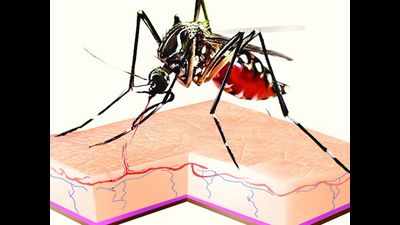- News
- City News
- bengaluru News
- Bengaluru reports 65% of Karnataka’s dengue cases in two weeks
Trending
This story is from July 20, 2019
Bengaluru reports 65% of Karnataka’s dengue cases in two weeks
Dengue scare has been growing and more so over the last two weeks, thanks to increasing mosquito menace propelled by intermittent rain.

(Representative image)
BENGALURU: Dengue scare has been growing and more so over the last two weeks, thanks to increasing mosquito menace propelled by intermittent rain.
In two weeks since July 4, the state has seen 1,714 dengue cases, whereas the number was 3,058 between January 1 and July 3. Overall, this year, the state reported 4,772 dengue cases. This means 35% of this year’s cases have been reported in the last two weeks alone.

While in the last two weeks, Bengaluru alone has witnessed 1,121 cases (65%), overall too, the highest number of cases (2,951) has been reported from the city.
On July 17, Jawaid Akhtar, principal secretary, health and family welfare department, wrote to the urban development department, alerting it about the growing number of dengue cases reported in the state. “Over 39% of the cases are from urban areas. The health department has taken up preventive measures on a war-footing and the same have to be effectively implemented in urban regions...,” his letter read.
Among the steps suggested are a regular supply of drinking water, appropriate solid waste management, implementation of civic bylaws to prevent mosquito breeding, effective survey of larvae breeding, cleanliness drives and engaging resident welfare associations in creating awareness.
The letter also pointed to curbing mosquito breeding at construction sites.
Data with the state health and family welfare department shows the number of cases has increased in the last two weeks. “The highest number of cases is from Bengaluru, which requires more focus and preventive measures ward off mosquitoes,” said Dr Sajjan Shetty, joint director, national vector-borne disease control programme.
BBMP chief health officer Dr BK Vijayendra said intermittent rain has resulted in an increase in mosquito menace. “BBMP has taken precautions. ASHA workers are visiting affected areas to educate the public about covering water containers; a household survey will be done soon,” he said.
For many residents of Bengaluru, storing water is a dire necessity and this is the biggest reason for the rising mosquito population, said, doctors.
“Mosquitoes breed inside homes and on terraces where there is stagnant water. The best way is to use mosquito nets to prevent dengue, maintain hygiene and make sure there is no larvae production in the house,” said a senior health official.
In two weeks since July 4, the state has seen 1,714 dengue cases, whereas the number was 3,058 between January 1 and July 3. Overall, this year, the state reported 4,772 dengue cases. This means 35% of this year’s cases have been reported in the last two weeks alone.

While in the last two weeks, Bengaluru alone has witnessed 1,121 cases (65%), overall too, the highest number of cases (2,951) has been reported from the city.
Apart from Bengaluru, Dakshina Kannada (353), Shivamogga (206), Kalaburagi (134), Haveri (129) too have reported a huge number of dengue cases. On July 18 alone, 54 persons from across the state tested positive for the disease.
On July 17, Jawaid Akhtar, principal secretary, health and family welfare department, wrote to the urban development department, alerting it about the growing number of dengue cases reported in the state. “Over 39% of the cases are from urban areas. The health department has taken up preventive measures on a war-footing and the same have to be effectively implemented in urban regions...,” his letter read.
Among the steps suggested are a regular supply of drinking water, appropriate solid waste management, implementation of civic bylaws to prevent mosquito breeding, effective survey of larvae breeding, cleanliness drives and engaging resident welfare associations in creating awareness.
The letter also pointed to curbing mosquito breeding at construction sites.
Data with the state health and family welfare department shows the number of cases has increased in the last two weeks. “The highest number of cases is from Bengaluru, which requires more focus and preventive measures ward off mosquitoes,” said Dr Sajjan Shetty, joint director, national vector-borne disease control programme.
BBMP chief health officer Dr BK Vijayendra said intermittent rain has resulted in an increase in mosquito menace. “BBMP has taken precautions. ASHA workers are visiting affected areas to educate the public about covering water containers; a household survey will be done soon,” he said.
For many residents of Bengaluru, storing water is a dire necessity and this is the biggest reason for the rising mosquito population, said, doctors.
“Mosquitoes breed inside homes and on terraces where there is stagnant water. The best way is to use mosquito nets to prevent dengue, maintain hygiene and make sure there is no larvae production in the house,” said a senior health official.
End of Article
FOLLOW US ON SOCIAL MEDIA










